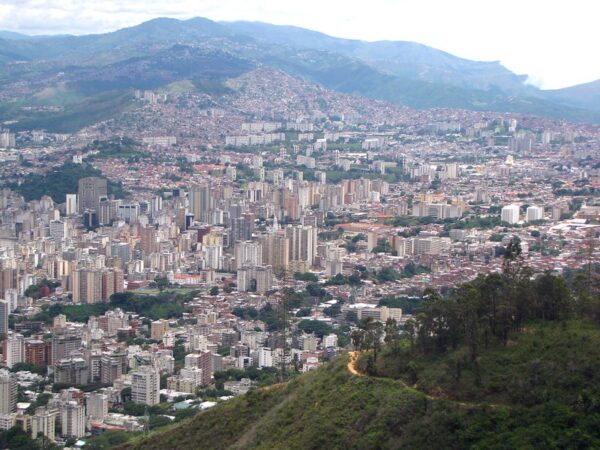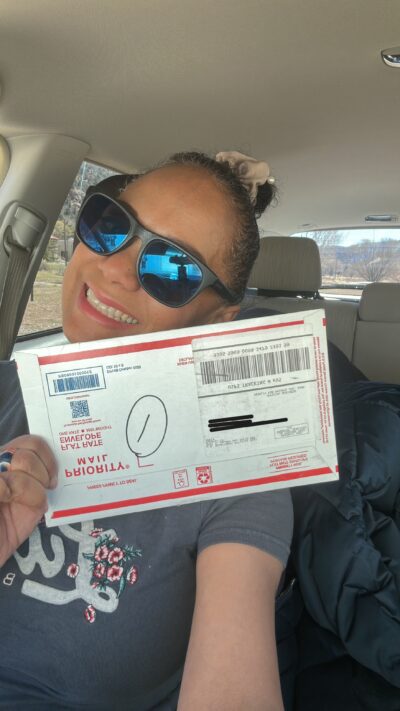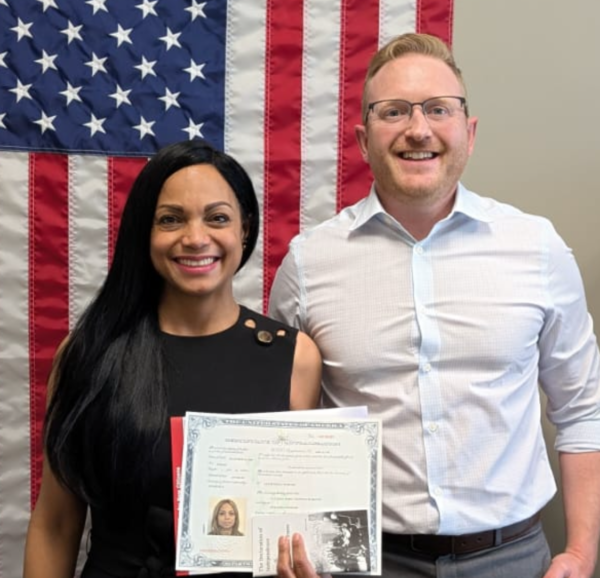Naturalization Is Celebration and Concern for a Venezuelan Mom and Entrepreneur
“Wash the sheets. Wash the towels. Restock soaps. Shampoo. Restock the kitchen. Paper towels. More soap. Clean everything-everything! All the surfaces. All the floors. All the rooms. All the showers,” Catalina Martinez catalogs the tasks she must accomplish to ready a vacation rental house between bookings. Ideally, all these tasks (and more) need to be wrapped up in under two hours because there is at least a dozen more houses in her daily queue.
Catalina remains unflappable as she rattles off her to-do list. She is made of equal parts endurance and patience. She is composed of these qualities in the same way vast swathes of Colorado Plateau are composed of sandstone or limestone.
As an independent contractor, Catalina runs a small platoon of cleaners who tend exclusively to luxury vacation rental homes. On any given day, she and her team will clean and prep nearly a dozen large domiciles. During peak season, they work 10-hour days, seven days a week.

Caracas, Venezuela
“For me it’s simple: working. Working and save money and buy a car and rent an apartment,” she says.
Catalina’s indomitable endurance built up in her first career as a lawyer in South and Central America. She was clear-eyed in coming to the U.S. that she’d likely wind up putting her legal profession aside for a long time until she had the language skills and knowledge of the law to practice. And she also knew most Latino immigrants took on service-sector work, most often as cleaning staff. Catalina resolved that if she had to clean, she was going to be her own boss. So, she enrolled in training and certification programs that enabled her to contract with high-end vacation home companies.
Catalina’s patience developed at home, where she was initially one among three siblings. When her parents separated, the family evolved and Catalina eventually wound up with a slew of half-siblings.
Recalling her formative years in Venezuela lights up Catalina’s whole being. “I live all my life in the city, in Caracas, the capitol. It is a big, beautiful city. Here is country. It’s different,” she says, referring to Durango, her home for the last three years.
A Hampered Homeland
Her nostalgia for Venezuela is overcast with a bit of gloom. In 2011, global oil prices plummeted effectively knee-capping the nation’s primary export. Venezuela slid into a deep recession that was so grossly mismanaged by national leaders, the country teetered on the brink of collapse. To date, over 7 million Venezuelans have fled from their country, seeking relief from extreme poverty or refuge from political persecution. Although narrowly elected to the Venezuelan presidency in 2011, Nicólas Maduro has since cemented an authoritarian grip on power using military might, corruption, and fraudulent election results according to global analysts at watchdog agencies. Critics of the government are routinely disappeared.[1]
The national turmoil scattered Catalina’s family much as a stiff wind gust turns a picnic blanket into a gingham catapult. Segments of the family fled to Spain, Mexico, Portugal, and Colombia. Catalina, along with her American husband, their three daughters, and her father relocated to Panama.
Once the girls reached adulthood, Catalina and her spouse moved again, this time to the United States. His job as an electrical engineer bounced him around the country, which enabled Catalina to visit 44 states! Backed by first-hand experience, she attests, “I love the United States. I feel good here.”
Although Catalina held a Green Card granting her legal status as a permanent resident of the U.S. for ten years, her footing was always tenuous. As the U.S. political pendulum swung between ideological extremes in each election cycle, the longstanding rules and procedures for renewing Green Cards frequently changed. Administrative processing times slowed, leaving Catalina vulnerable for deportation. As a result, she could no longer risk international travel. She could not go home—not even when one of her daughters graduated from university. She could not go home—not even to say goodbye to her father before or after his death. It’s been over two decades since Catalina has seen her whole family.
To make matters worse, Catalina’s marriage ended in divorce. Her best friend, who was living in Pagosa Springs, convinced Catalina that what she needed was a life reboot out in the West, breathing in nothing but fresh mountain air. So, Catalina relocated from Florida to Durango. She did not regret her decision. She notes, “The people are very sweet. It’s very quiet. It’s very nice.”
Inspired to Speak
Nice though it is, small-town life has its inconveniences. Dissolving a marriage that existed across several international borders involved complex legal proceedings. With no local translation services to tap, Catalina had to pay for remote agencies to translate documents. In the end, she felt inspired to polish her English language skills. Maybe she could reignite her legal career by opening a translation business that served the remote Four Corners region?
“Maybe I study English and maybe I do it,” she nods.

Catalina rejoices in the arrival of her U.S. passport.
Catalina began taking English as a Second Language classes at the Durango Adult Education Center (DEAC). For two years, she attended night classes after working full days cleaning and coordinating her staff. Fortunately, she felt immediately at ease at the caring learning center. The staff and teachers were kind and her classmates worked as hard as she did.
“It’s good. I like it,” Catalina reports on the DAEC. “Every person has different English, but this is the one place we all can practice English.”
As 2024 neared an end, Catalina realized her English language skills were going to be needed for something other than opening a new business: naturalization.
“I see the news. I read the news every day,” she says. “Nobody’s safe here. You have Green Card; it was the top. Now Green Card doesn’t matter. I take the decision for naturalization so I can feel safe because he [the President] can make any decision.”
She switched from ES classes to citizenship tutoring at the DAEC to focus on the gargantuan task of becoming a U.S. citizen. She had a mountain of paperwork to assemble, plus, she needed to study for the citizenship test, comprising an interview in English and a random selection of 10 U.S. civics and history questions drawn from a pool of 100 trivia items.
Catalina tapped both stores of endurance and patience, fully expecting a long, drawn-out process. Much to her surprise, her citizenship test was scheduled only a couple weeks after making the request. Once in Denver, she whipped through the interview and the exam, passing both with ease. Although previously, she’d been told that her official swearing in ceremony would take place weeks after the exam, Catalina was invited to partake in a ceremony that same day! And, just two weeks after submitting the paperwork for a U.S. passport, Catalina received a priority mail envelope from the State Department.
She slides the passport out of the envelope and displays it with pride. She beams as she applies her signature under her photograph, noting that she will get to travel home and see her youngest daughter graduate from college.
But the joy fades almost as quickly as it blossomed. She says, “Still I am scared. I can see on TikTok—they say Trump signed an order to revoke all citizenship of Latinos. And I go: What?!” Most days, she dives down internet rabbit holes trying to corroborate the truth or debunk false information sloshing around online. She and so many others ride this emotional rollercoaster daily.
A Blessing or a Curse
The fears are warranted as the White House carries out aggressive citizenship revocation and mass deportation agendas. The U.S. Supreme Court has agreed to hear arguments on the legitimacy of birthright citizenship.[2] Meanwhile, hasty dragnets removed hundreds of immigrants to detention centers across the South, or in some cases, to notorious prisons in foreign countries like El Salvador, despite many having legal or protected status.[3]
Catalina views both immigration and citizenship through a rightfully nuanced lens. She points out, “It’s not the responsibility of the United States to take care of all the people coming here with problems.” She goes on to explain that the uptick in immigration over recent years may be too massive for government aid to solve. However, she argues for compassion on behalf of the human beings impacted by all the conflicting policies.

Catalina and an official from the U.S. Citizenship and Immigration Services (USCIS) office in Denver celebrate her swearing in.
“I don’t agree with the deportations, of course. I am Latina. In the United States, we are needed to work. Who clean in the hospitals? Who clean in the hotels? Who clean in the restaurants? Who? The people Latino are doing this job. It’s not easy,” she states. Catalina also does not agree that traveling into a foreign country without proper documentation qualifies as a crime. She says, “It’s different. It’s different when the people are killing another person or kidnapping another person.” Those actions, according to her legal training, are genuine crimes committed by genuine criminals.
From her experience, most people coming to the U.S. are not criminals; they are humans in need of refuge and opportunity.
“The people coming here for work. The people coming here for freedom. The people coming here for the opportunity. They are working here to save money for their family,” she explains.
Normally, becoming a naturalized citizen of the United States is a joyous occasion offering the successful applicant the right to vote in elections and the freedom to travel anywhere without fear. The payoff for steadily accumulating documentation, cultural knowledge, and literacy forms a solid fortress of belonging as permanent as sandstone and limestone, endurance and patience. For Catalina, the victory rings hollow. Her efforts seem to have forged little more than a sandcastle besieged by a rising tide.
[1] https://www.bbc.com/news/world-latin-america-48121148 and https://www.brookings.edu/articles/venezuelas-maduro-has-lost-the-legitimacy-to-govern-what-the-world-must-do-now/
[2] https://www.scotusblog.com/2025/04/justices-will-hear-arguments-on-trumps-effort-to-end-birthright-citizenship/
[3] https://apnews.com/article/trump-biden-deportations-border-immigration-bcd2737e6f9b482ec500238c6caa4f35 and https://www.pbs.org/newshour/show/migrants-in-u-s-legally-and-with-no-criminal-history-caught-up-in-trump-crackdown and https://www.cfr.org/in-brief/heres-where-trumps-deportations-are-sending-migrants
Image credit: “Vista de Caracas” by Cristóbal Alvarado Minic, CC-BY 2.0


